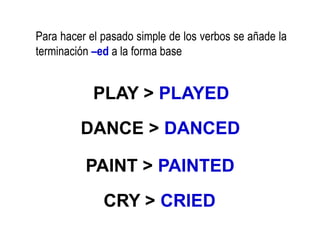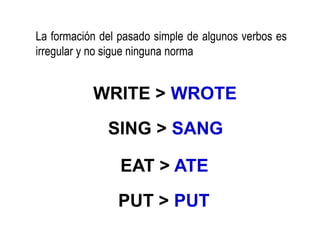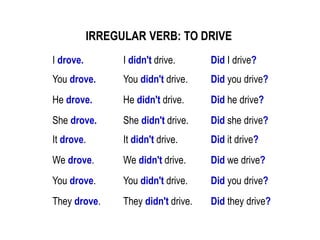Simple past
- 2. Se emplea para hablar de acciones que ocurrieron en el pasado We didn't see Jack last night > No vimos a Jack anoche I went there last year > Fui allí el año pasado. You lived in Paris, didn't you? > Vivías en París, ¿verdad? He worked there in 1980 > Él trabajaba allí en 1980. She saw him yesterday > Ella lo vio ayer. What did they talk about? > ¿Sobre qué charlaron?
- 3. Para hacer el pasado simple de los verbos se añade la terminación –ed a la forma base PLAY > PLAYED DANCE > DANCED PAINT > PAINTED CRY > CRIED
- 4. La formación del pasado simple de algunos verbos es irregular y no sigue ninguna norma WRITE > WROTE SING > SANG EAT > ATE PUT > PUT
- 5. LOS VERBOS IRREGULARES PUEDES PRACTICARLOS AQUÍ
- 6. Para negar hechos del pasado se utiliza el auxiliar de pasado: didn’t. El verbo pasa a estar en la forma base I played I didn’t play > You sang > You didn’t sing He danced > He didn’t dance They put > They didn’t put
- 7. They didn’t drive a car yesterday They didn’t make a cake yesterday They sang a nice song yesterday
- 8. Para preguntar hechos del pasado se utiliza el auxiliar de pasado: did. El verbo pasa a estar en la forma base She painted Did she paint? > You sang > Did you sing? They wrote > Did they write? He ate > Did he eat?
- 9. Did he study French? No he didn’t Did he bake a cake? No he didn’t Did he dance rock? Yes, he did
- 10. I worked. I didn't work. Did I work? You worked. You didn't work. Did you work? He worked. He didn't work. Did he work? She worked. She didn't work. Did she work? It worked. It didn't work. Did it work? We worked. We didn't work. Did we work? You worked. You didn't work. Did you work? They worked. They didn't work. Did they work? REGULAR VERB: TO WORK
- 11. I drove. I didn't drive. Did I drive? You drove. You didn't drive. Did you drive? He drove. He didn't drive. Did he drive? She drove. She didn't drive. Did she drive? It drove. It didn't drive. Did it drive? We drove. We didn't drive. Did we drive? You drove. You didn't drive. Did you drive? They drove. They didn't drive. Did they drive? IRREGULAR VERB: TO DRIVE
- 12. Hay algunos verbos que funcionan de manera diferente a los dem√°s
- 13. EL PASADO SIMPLE I was. I wasn't. Was I? You were. You weren’t. Were you? He was. He wasn't. Was he? She was. She wasn't. Was she? It was. It wasn't. Was it? We were. We weren’t. Were we? You were. You weren’t. Were you? They were. They weren’t. Were they? REGULAR VERB: TO BE
- 14. EL PASADO SIMPLE I had. I hadn't. Had I? You had. You hadn't. Had you? He had. He hadn't. Had he? She had. She hadn't. Had she? It had. It hadn't. Had it? We had. We hadn't. Had we? You had. You hadn't. Had you? They had. They hadn't. Had they? REGULAR VERB: TO HAVE
- 15. EL PASADO SIMPLE I could. I couldn’t. Could I? You could. You couldn’t. Could you? He could. He couldn’t. Could he? She could. She couldn’t. Could she? It could. It couldn’t. Could it? We could. We couldn’t. Could we? You could. You couldn’t. Could you? They could. They couldn’t. Could they? REGULAR VERB: CAN














